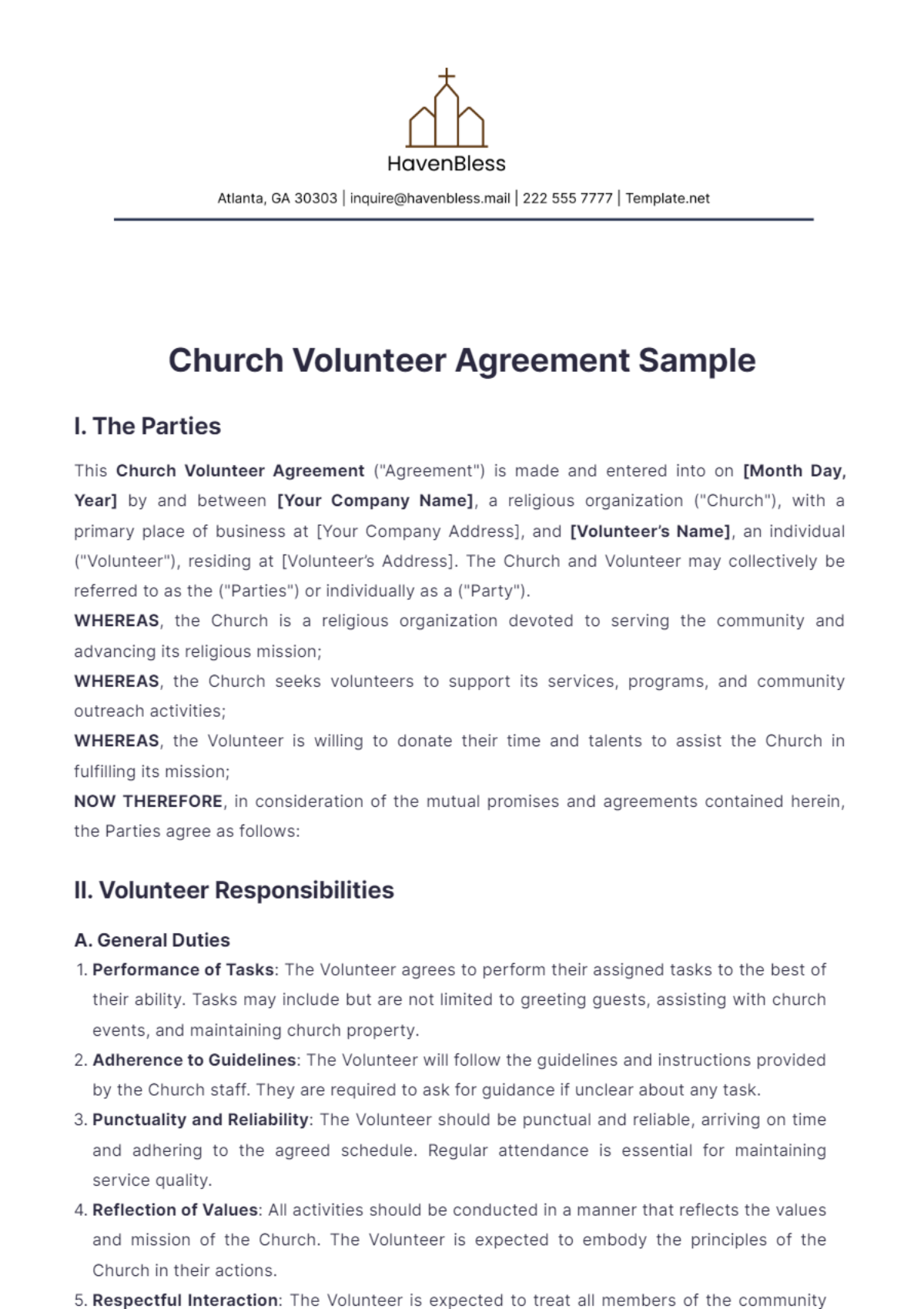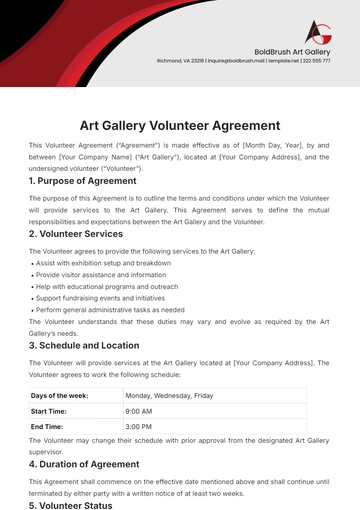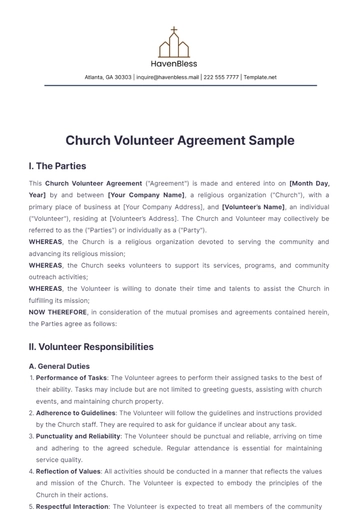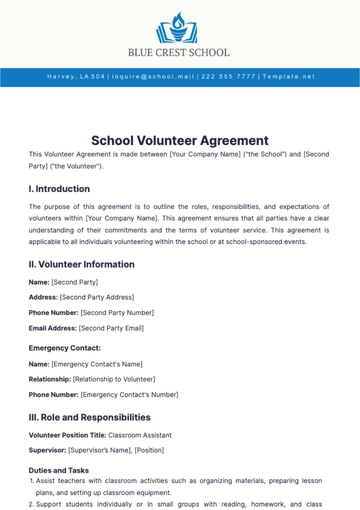Free Church Volunteer Agreement Sample

I. The Parties
This Church Volunteer Agreement ("Agreement") is made and entered into on [Month Day, Year] by and between [Your Company Name], a religious organization ("Church"), with a primary place of business at [Your Company Address], and [Volunteer’s Name], an individual ("Volunteer"), residing at [Volunteer’s Address]. The Church and Volunteer may collectively be referred to as the ("Parties") or individually as a ("Party").
WHEREAS, the Church is a religious organization devoted to serving the community and advancing its religious mission;
WHEREAS, the Church seeks volunteers to support its services, programs, and community outreach activities;
WHEREAS, the Volunteer is willing to donate their time and talents to assist the Church in fulfilling its mission;
NOW THEREFORE, in consideration of the mutual promises and agreements contained herein, the Parties agree as follows:
II. Volunteer Responsibilities
A. General Duties
Performance of Tasks: The Volunteer agrees to perform their assigned tasks to the best of their ability. Tasks may include but are not limited to greeting guests, assisting with church events, and maintaining church property.
Adherence to Guidelines: The Volunteer will follow the guidelines and instructions provided by the Church staff. They are required to ask for guidance if unclear about any task.
Punctuality and Reliability: The Volunteer should be punctual and reliable, arriving on time and adhering to the agreed schedule. Regular attendance is essential for maintaining service quality.
Reflection of Values: All activities should be conducted in a manner that reflects the values and mission of the Church. The Volunteer is expected to embody the principles of the Church in their actions.
Respectful Interaction: The Volunteer is expected to treat all members of the community with respect and compassion. Demonstrating ethical behavior at all times is mandatory.
B. Confidentiality
Privacy Respect: The Volunteer must respect the privacy and confidentiality of all church members and staff. Any personal information learned during the course of volunteering should not be disclosed to third parties.
Non-Disclosure: The Volunteer must not share or disseminate any internal church communications, materials, or sensitive information without permission.
Consequences of Breach: Breaches of confidentiality may result in immediate termination of the volunteer relationship and potential legal action. Strict adherence to confidentiality is critical.
Guidance on Confidentiality: The Volunteer should direct any questions about confidentiality or information sharing to their supervisor. Seeking clarification ensures compliance.
C. Conduct and Behavior
Code of Conduct: The Volunteer is expected to adhere to the Church's code of conduct at all times. Respectful and ethical behavior is mandatory while interacting with Church members and participants.
Dress Code: Proper dress code as indicated by the Church must be followed during service hours. Dressing appropriately reflects the Church’s values.
Zero Tolerance for Misconduct: Any form of discrimination, harassment, or misconduct will not be tolerated. Immediate action will be taken against such behavior.
Disciplinary Actions: In case of any misconduct, the Volunteer will be given a verbal warning initially. Continuous violations will lead to a formal written warning and a meeting with the Volunteer Coordinator. Severe or repeated violations can lead to immediate termination of the volunteer relationship.
Professionalism: The Volunteer should conduct themselves with professionalism at all times. This includes maintaining a positive attitude and showing respect to all individuals.
III. Church Responsibilities
A. Support and Training
Provision of Training: The Church will provide the necessary training and resources to enable the Volunteer to perform their duties effectively. Comprehensive training ensures readiness.
Assignment of Supervisor: The Church will assign a supervisor to the Volunteer, who will be available to provide guidance and support. The supervisor acts as the primary point of contact.
Regular Feedback: The Church will offer regular feedback to help the Volunteer improve their performance and experience. Constructive feedback is essential for growth.
Policy Awareness: The Church will ensure that the Volunteer is aware of all relevant policies and procedures. Clear communication of policies is vital.
Encouragement of Development: The Church will encourage the Volunteer’s personal and spiritual development. Opportunities for growth will be provided.
B. Safe Environment
Safety Commitment: The Church will maintain a safe and welcoming environment for all volunteers. Safety is a top priority.
Addressing Concerns: The Church is committed to addressing any safety concerns or incidents that may arise during the Volunteer’s service. Prompt attention to issues is guaranteed.
Provision of Equipment: The Church will provide the Volunteer with necessary protective equipment and training as applicable. Proper equipment use is mandatory.
Legal Compliance: The Church will comply with all relevant laws and regulations related to volunteer work. Adherence to legal standards is mandatory.
Emergency Procedures: The Church will ensure that the Volunteer is aware of emergency procedures. Knowledge of emergency protocols is crucial.
IV. Term and Termination
A. Term
Commencement of Agreement: This Agreement will commence on the Effective Date and will remain in effect until terminated by either Party. The duration of the term is mutually agreed upon.
Voluntary Termination: The Volunteer may choose to end their volunteer service at any time by providing written notice to the Church. A notice period of [Number] days is required.
Church's Right to Terminate: The Church reserves the right to terminate the Volunteer’s service at its discretion, with or without cause. Termination may occur with immediate effect if necessary.
Review Periods: Regular review periods will be established to assess the Volunteer’s performance and engagement. Reviews help in mutual assessment and feedback.
Extension of Service: If mutually agreed, the term of service may be extended. Any extensions will be documented in writing.
B. Post-Termination Obligations
Return of Property: Upon termination, the Volunteer agrees to return all church property and materials that had been provided for the performance of duties. Timely return of property is mandatory.
Continued Confidentiality: The Volunteer must maintain confidentiality of all church-related information even after their service has ended. Ongoing confidentiality is crucial.
Final Report: The Volunteer may be required to provide a final report on their activities and contributions. The report should be comprehensive and submitted promptly.
Exit Interview: An exit interview may be conducted to discuss the Volunteer’s experience and gather feedback. The interview helps in continuous improvement.
Re-Engagement: Former volunteers may be considered for future service opportunities. Re-engagement will be based on mutual agreement.
V. Conduct and Behavior
A. Code of Conduct
Adherence to Conduct: The Volunteer is expected to adhere to the Church's code of conduct at all times. Respectful and ethical behavior is mandatory while interacting with Church members and participants.
Proper Dress Code: Proper dress code as indicated by the Church must be followed during service hours. Dressing appropriately reflects the Church’s values.
Zero Tolerance Policy: Any form of discrimination, harassment, or misconduct will not be tolerated. Immediate action will be taken against such behavior.
Disciplinary Actions: In case of any misconduct, the Volunteer will be given a verbal warning initially. Continuous violations will lead to a formal written warning and a meeting with the Volunteer Coordinator. Severe or repeated violations can lead to immediate termination of the volunteer relationship.
Professionalism: The Volunteer should conduct themselves with professionalism at all times. This includes maintaining a positive attitude and showing respect to all individuals.
B. Respectful Interaction
Interaction with Members: The Volunteer must treat all church members, staff, and visitors with respect and kindness. Positive interactions foster a welcoming environment.
Conflict Resolution: Any conflicts or issues should be resolved respectfully and in a manner that aligns with the Church’s principles. Seeking mediation if necessary is encouraged.
Diversity and Inclusion: The Volunteer should promote and uphold principles of diversity and inclusion within the Church community. Respect for all individuals is paramount.
Collaboration and Teamwork: The Volunteer should work collaboratively with other volunteers and staff members. Teamwork enhances the effectiveness of service activities.
C. Ethical Standards
Integrity and Honesty: The Volunteer must demonstrate integrity and honesty in all actions and decisions. Upholding ethical standards is non-negotiable.
Responsibility and Accountability: The Volunteer should take responsibility for their actions and be accountable for their tasks. Accountability ensures reliability.
Respect for Property: The Volunteer must respect church property and the property of others. Any damage should be reported immediately.
Privacy and Confidentiality: The Volunteer should maintain privacy and confidentiality of sensitive information. This includes not discussing private matters in public settings.
Role Model Behavior: The Volunteer is expected to act as a role model for others in the Church community. Setting a positive example is important.
VI. Liability and Insurance
A. Liability
Church’s Liability: The Church is not liable for any injury, loss, or damage whatsoever suffered by the Volunteer during the course of their duties, except where caused by the Church’s gross negligence.
Indemnification: The Volunteer agrees to indemnify and hold the Church harmless from any claims arising out of their volunteer activities. This includes any legal fees incurred.
Personal Insurance: The Volunteer is responsible for their own insurance coverage in the event of personal injury or illness resulting from their activities. Ensuring personal coverage is advised.
Safe Environment: The Church will take reasonable steps to provide a safe working environment for the Volunteer. Regular safety checks and protocols will be followed.
Incident Reporting: The Volunteer must report any accidents or incidents immediately to their supervisor. Prompt reporting helps in addressing issues effectively.
B. Insurance
Encouragement of Personal Insurance: The Volunteer is encouraged to carry personal liability insurance to cover any potential loss or damage. Personal insurance provides additional security.
Church’s Insurance Coverage: The Church will include volunteers under its general liability insurance policy for incidents that may occur under its supervision. This provides a level of coverage for the Volunteer.
Insurance Documentation: The Volunteer should provide any required documentation related to their personal insurance. Keeping records up to date is essential.
Coverage Limitations: The Church’s insurance policy may have limitations and exclusions. The Volunteer should be aware of these details.
VII. Use of Church Property
A. Equipment and Materials
Responsible Use: All church property, including equipment, materials, and supplies, must be used responsibly and only for church-related activities. Misuse of property is prohibited.
Care and Maintenance: The Volunteer is responsible for taking care of any church property they use and should report any damage or issues immediately. Proper maintenance is mandatory.
Prohibited Use: Unauthorized use or removal of church property is prohibited and may lead to termination. Ensuring authorization before use is required.
Guidelines and Instructions: The Volunteer should follow all guidelines and instructions provided for the use of church property. Adherence to instructions ensures safety and efficiency.
Return of Equipment: All equipment must be returned in the condition it was received. This ensures the longevity and availability of church resources.
B. Return of Property
Property Return upon Termination: Upon termination of the volunteer service, the Volunteer shall return all church equipment, materials, and supplies issued to them. Timely return is mandatory.
Legal Action: Failure to return church property may result in legal action to recover the items or their value. Compliance with return policies is essential.
Inventory Check: An inventory check will be conducted to ensure all property is accounted for. Proper documentation of returned items will be maintained.
Property Condition: Returned property should be in good condition. Any damages will be assessed and addressed accordingly.
Acknowledgment of Return: The Volunteer should acknowledge the return of property in writing. This provides a record for both parties.
VIII. Communication and Media
A. Internal Communications
Discretion in Communication: The Volunteer should use discretion when communicating internally and ensure that all information shared is accurate and appropriate. Clear communication prevents misunderstandings.
Positive Communication: The Volunteer must not engage in gossip, spreading rumors, or any form of negative communication within the church. Maintaining a positive environment is crucial.
Official Channels: The Volunteer is encouraged to use the church's official communication channels for any church-related discussions or questions. Official channels ensure accurate dissemination of information.
Reporting Issues: Any issues or concerns should be reported through the appropriate channels. Timely reporting helps in addressing matters effectively.
Confidential Information: Confidential information should only be shared with authorized personnel. Protecting sensitive information is mandatory.
B. External Communications
Authority to Speak: The Volunteer must not speak on behalf of the Church or disclose any information to the media unless explicitly authorized to do so. Unauthorized communication is prohibited.
Media Requests: Any requests for media interviews or statements should be directed to the Church’s media spokesperson or designated representative. Proper channels should be followed.
Social Media Content: The Volunteer should seek approval before posting any church-related content on social media platforms. Approved content reflects the Church’s values.
Public Statements: Public statements should align with the Church’s mission and values. Ensuring consistency in messaging is essential.
External Inquiries: Any external inquiries should be handled professionally and directed to the appropriate personnel. Prompt and accurate responses are important.
IX. Dispute Resolution
A. Informal Resolution
Discussion and Negotiation: The Parties will first attempt to resolve any disputes or concerns informally through discussion and negotiation. Open communication can often resolve issues.
Escalation: The Volunteer should escalate any unresolved issues to their supervisor or the church leadership for further review. Proper escalation ensures issues are addressed.
Timely Resolution: Efforts should be made to resolve disputes in a timely manner. Prompt resolution prevents further escalation.
Documentation: All discussions and resolutions should be documented. Maintaining records helps in future reference.
B. Mediation
Engagement in Mediation: If informal resolution is not successful, the Parties agree to engage in mediation with a mutually agreed-upon mediator. Mediation provides a structured approach to dispute resolution.
Cost Sharing: The cost of mediation will be shared equally by the Parties, unless otherwise agreed. Equal sharing ensures fairness.
Mediator Selection: The Parties will collaborate to select a suitable mediator. The mediator should be neutral and experienced.
Confidential Process: Mediation proceedings will be confidential. This encourages open and honest communication.
Binding Agreement: Any agreement reached through mediation will be binding on both Parties. Ensuring adherence to the agreement is crucial.
X. Miscellaneous
A. Amendments
Written Amendments: This Agreement may be amended only in writing and signed by both Parties. Written documentation ensures clarity.
Verbal Agreements: No verbal agreements or changes will be recognized unless documented in writing and signed by both Parties. Written records prevent misunderstandings.
Notice of Changes: Any proposed changes should be communicated to both Parties in advance. Adequate notice allows for review and agreement.
Effective Date of Amendments: Amendments will take effect on the date specified in the written agreement. Clear effective dates prevent confusion.
B. Governing Law
State Law: This Agreement shall be governed by and construed in accordance with the laws of the state in which the Church is located. Compliance with local laws is mandatory.
Legal Proceedings: Any legal action or proceeding arising out of or relating to this Agreement shall be brought in the courts of the state in which the Church is located. Jurisdiction and venue are agreed upon.
Dispute Resolution: All legal disputes will be resolved in accordance with the laws of the state. Adherence to legal processes is required.
C. Entire Agreement
Comprehensive Agreement: This Agreement constitutes the entire agreement between the Parties concerning the subject matter herein. All prior agreements, understandings, and representations are superseded by this Agreement.
No Other Agreements: No other agreements, understandings, or representations will be recognized unless incorporated into this Agreement. Ensuring all terms are included is important.
Binding Nature: This Agreement is binding on both Parties. Adherence to the terms and conditions is mandatory.
D. Severability
Severability Clause: If any provision of this Agreement is found to be invalid or unenforceable, the remaining provisions will continue in full force and effect. Ensuring the validity of the Agreement is crucial.
Revision of Invalid Provisions: Invalid provisions will be revised to reflect the intent of the Parties. Revisions will be made in accordance with the law.
Continuity of Agreement: The Agreement will remain effective despite any invalid provisions. Ensuring the overall validity is important.
XI. Signatures
IN WITNESS WHEREOF, the Parties have executed this Agreement as of the Effective Date.
Church

[Authorized Representative Name]
[Your Company Name]
Date: [Month Day, Year]
Volunteer

[Volunteer's Name]
Date: [Month Day, Year]
- 100% Customizable, free editor
- Access 1 Million+ Templates, photo’s & graphics
- Download or share as a template
- Click and replace photos, graphics, text, backgrounds
- Resize, crop, AI write & more
- Access advanced editor
Formalize volunteer commitments in a few easy edits with the Church Volunteer Agreement Sample Template! Available only here on Template.net, this template is made to be editable and can be easily customizable to fit your church’s specific volunteer roles and responsibilities. The AI Editor Tool ensures accurate and easy personalization!
You may also like
- Lease Agreement
- Non Compete Agreement
- Rental Agreement
- Prenuptial Agreement
- Non Disclosure Agreement
- Operating Agreement
- Hold Harmless Agreement
- LLC Operating Agreement
- Arbitration Agreement
- Purchase Agreement
- Residential Lease Agreement
- Executive Agreement
- Confidentiality Agreement
- Contractor Agreement
- Partnership Agreement
- Postnuptial Agreement
- Collective Bargaining Agreement
- Loan Agreement
- Roommate Agreement
- Commercial Lease Agreement
- Separation Agreement
- Cohabitation Agreement
- Room Rental Agreement
- Child Custody Agreement
- Employee Agreement
- License Agreements
- Settlement Agreement
- Joint Venture Agreement
- Indemnity Agreement
- Subordination Agreement
- Sales Agreement
- Agreements Between Two Parties
- Business Agreement
- Real Estate Agreement
- HR Agreement
- Service Agreement
- Property Agreement
- Agreement Letter
- Restaurant Agreement
- Construction Agreement
- Finance Agreement
- Marketing Agreement
- Payment Agreement
- Investment Agreement
- Management Agreement
- Nonprofit Agreement
- Software Agreement
- Startup Agreement
- Agency Agreement
- Copyright Agreement
- Collaboration Agreement
- Reseller Agreement
- Car Rental Agreement
- Cleaning Services Agreement
- Consultant Agreement
- Deed Agreement
- Car Agreement
- Equipment Agreement
- Shares Agreement
- Data Sharing Agreement
- Advertising Agreement
- School Agreement
- Franchise Agreement
- Event Agreement
- Travel Agency Agreement
- Vehicle Agreement
- Board Resolution Agreement
- Land Agreement
- Binding Agreement
- Tenancy Agreement
- Exclusive Agreement
- Development Agreement
- Assignment Agreement
- Design Agreement
- Equity Agreement
- Mortgage Agreement
- Purchase and Sale Agreement
- Shareholder Agreement
- Vendor Agreement
- Royalty Agreement
- Vehicle Lease Agreement
- Hotel Agreement
- Tenant Agreement
- Artist Agreement
- Commission Agreement
- Consignment Agreement
- Debt Agreement
- Recruitment Agreement
- Training Agreement
- Transfer Agreement
- Apprenticeship Agreement
- IT and Software Agreement
- Referral Agreement
- Resolution Agreement
- Waiver Agreement
- Consent Agreement
- Partner Agreement
- Social Media Agreement
- Customer Agreement
- Credit Agreement
- Supply Agreement
- Agent Agreement
- Brand Agreement
- Law Firm Agreement
- Maintenance Agreement
- Mutual Agreement
- Retail Agreement
- Deposit Agreement
- Land Purchase Agreement
- Nursing Home Agreement
- Supplier Agreement
- Buy Sell Agreement
- Child Support Agreement
- Landlord Agreement
- Payment Plan Agreement
- Release Agreement
- Research Agreement
- Sponsorship Agreement
- Buyout Agreement
- Equipment Rental Agreement
- Farm Agreement
- Manufacturing Agreement
- Strategic Agreement
- Termination of Lease Agreement
- Compliance Agreement
- Family Agreement
- Interior Design Agreement
- Ownership Agreement
- Residential Lease Agreement
- Retainer Agreement
- Trade Agreement
- University Agreement
- Broker Agreement
- Dissolution Agreement
- Funding Agreement
- Hosting Agreement
- Investor Agreement
- Memorandum of Agreement
- Advisory Agreement
- Affiliate Agreement
- Freelancer Agreement
- Grant Agreement
- Master Service Agreement
- Parking Agreement
- Subscription Agreement
- Trust Agreement
- Cancellation Agreement
- Horse Agreement
- Influencer Agreement
- Membership Agreement
- Vacation Rental Agreement
- Wholesale Agreement
- Author Agreement
- Distributor Agreement
- Exchange Agreement
- Food Agreement
- Guarantee Agreement
- Installment Agreement
- Internship Agreement
- Music Agreement
- Severance Agreement
- Software Development Agreement
- Storage Agreement
- Facility Agreement
- Intercompany Agreement
- Lending Agreement
- Lodger Agreement
- Outsourcing Services Agreement
- Usage Agreement
- Assurance Agreement
- Photography Agreement
- Profit Sharing Agreement
- Relationship Agreement
- Rent To Own Agreement
- Repayment Agreement
- Volunteer Agreement
- Co Parenting Agreement
- HVAC Agreement
- Lawn Care Agreement
- SAAS Agreement
- Work from Home Agreement
- Coaching Agreement
- Protection Agreement
- Security Agreement
- Repair Agreement
- Agreements License




